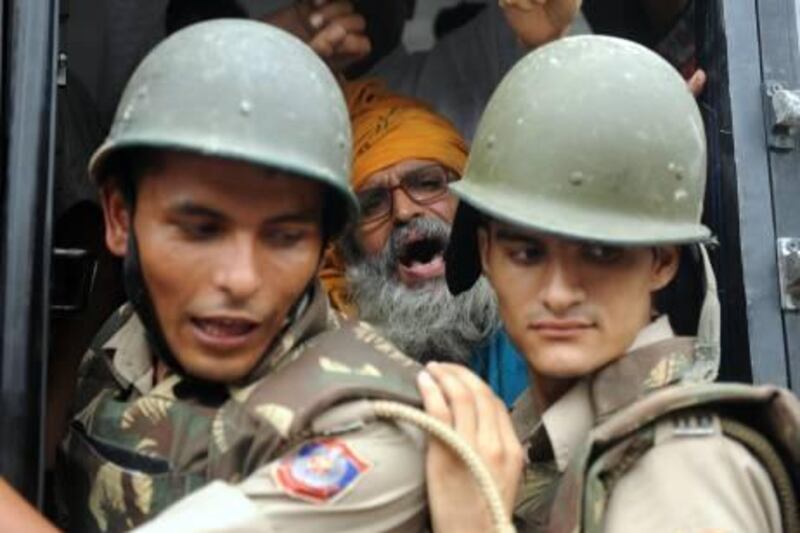NEW DELHI // Protests erupted throughout the capital yesterday, a day after the 64th anniversary of India's independence.
Police cracked down on protesters and thousands of people were detained.
In the day's most surreal twist, the leader of the anti-corruption demonstrations - 73-year-old Anna Hazare - was sent to Tihar Jail, the same New Delhi prison that houses former government officials Suresh Kalmadi and A Raja, who are awaiting trial on corruption charges.
In pictures: Protests in India over corruption and arrest of activist Anna Hazare
The arrest of Mr Hazare drew thousands of people onto the streets of more than 30 cities, including Mumbai, Chennai and Bangalore, and in other, smaller towns across the country. Even non-resident Indians from the UAE had travelled to India to protest.
As the numbers of protesters swelled, it became clear that there was insufficient space in New Delhi's prisons. The demonstrators were rounded up from various parts of city and taken to Chhatrasal Stadium.
But when the sports facility reached capacity, the protesters were left at the gates.
"We have courted arrest voluntarily," said K K Saratchandra Bose, a Dubai-based lawyer, who was detained at the stadium along with other protesters. He estimated that at least 5,000 people were in the stadium with him.
Mr Hazare has been warning the government about the protests for more than a month, and demanding that it pass his version of an anti-corruption bill. It would apply to offices as high as the prime minister.
The rapid proliferation of the anti-graft protests has highlighted the severity of India's corruption problem. The scandals could significantly weaken, if not topple, the government.
Mr Hazare indicated as much during a press conference on Sunday: "We are not interested in pulling down the government but during our fight for change, if it falls, we don't care."
Over the last year, the government, led by the Congress Party, has endured several corruption scandals.
Telecom licences have been sold at suspiciously low prices. Government housing has been allocated to officials' relatives. In the run-up to the Commonwealth Games last October, officials awarded contracts without following guidelines, leading India's comptroller-general to level strong accusations of corruption.
In response to a message from Arvind Kejriwal, the founder of India Against Corruption, more than 12 million people have registered their support by calling a hotline. More than 60,000 people have also sent emails to government officials calling for them to adopt Mr Hazare's anti-corruption bill.
India Against Corruption is a movement that was created last year in response to the scandals regarding the Commonwealth Games and telecom licences.
In Chennai, more than 2,000 protesters gathered at a construction site after being denied permission by the local government to gather in a public place.
Sahana Chandrasekhar, 18, a student and a volunteer with the India Against Corruption in Chennai, said 50 people volunteered to be arrested and another 200 started a fast yesterday, in a show of solidarity with Mr Hazare.
"The government is clearly threatened or intimidated by the number of people who are a part of this movement," Ms Chandrasekhar said.
The protests in the capital drew the largest and most diverse crowds. Farmers, students, professionals and businessmen chanted slogans such as "I am Anna. Arrest me". They also sang patriotic songs.
Piyush Rai, 26, and his friend Animesh Tripathi, 27, both engineers, said they were at the protest to help change the minds of their friends, who said corruption was inevitable in India.
"Most of our friends are unmoved," said Mr Rai. "They say, 'nothing will change.' That's the mentality of the Indian people and we want to change that."
Dilbar Singh, 51, a farmer from the state of Haryana travelled two hours to reach the capital. He drove his tractor 40 kilometres to Sonepat. then boarded a bus and walked to the protest grounds where he was arrested.
"Corruption has robbed this country and eaten away its core," he said. "When I left home, I told my family that if I am arrested or beaten dead for joining the protest, then you will know that my soul has been liberated."
Mr Singh was protesting the corruption he has experienced first-hand trying to tend to his fields. "Farmers are dead. Inflation has killed us. We have to bribe officials to get electricity to power our motors to bring water to the fields; we have to bribe people even to buy oil to power that generator."
Vikas Puri, 20, a student from New Delhi, was arrested along with 15 of his friends for protesting near the Delhi Legislative Assembly and were taken to the stadium. He said his friends were responding to a rallying call by Mr Hazare who asked Indians to come out yesterday and "jail bharo", - Hindi for "fill the jails". It is borrowed from the Gandhian philosophy of peaceful civil disobedience.
"Let's see how much space they have in their jails," said Mr Puri. "I woke up and told my parents today that I am going into the world to do some good."
Mr Puri ran afoul of India's endemic corruption two days ago when he tried to renew his passport. He was asked to pay 400 rupees to grease the palm of an official who refused to complete his paperwork without the kickback.
"It is official that unofficially you have to pay a bribe," said Mr Puri. "But you cannot imagine the shame I felt for this country and the anger I felt. I essentially had to buy my right to a passport."
SBhattacharya@thenational.ae
SSubramanian@thenational.ae
pkannan@thenational.ae
Additional reporting by Preeti Kannan in Dubai





